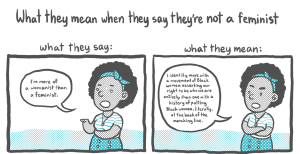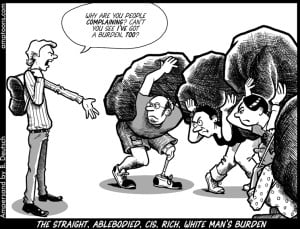
Credit: The Nation
As we learned from how Romney sees 47% of Americans, at times some people who are wealthy will give the public misguided advice on how to acquire wealth – and end up blaming the non-wealthy for being too lazy to be rich.
In a tough love or outright condescending tone, they might say something like “If you would just work hard, be creative, and apply yourself more, you too can be wealthy.”
Though working hard and being smart are important, the economic downturn has revealed to many in the Western world what most people with financial struggles have already known -that there is more to being well-off than putting your nose to the grindstone.
Among the factors that play a part in wealth are economic advantages, both fair and unfair, that exist in our society. Things like race, family background, and access to education all have an effect on the wealth building opportunities available to people.
If we don’t acknowledge this, we run the risk of perpetuating stereotypes that the poor are entitled, bitter, uneducated, unintelligent, or lazy in comparison to their wealthier counterparts.
To dispel these stereotypes, we invite you to look at the following facts about wealth creation:
- Family Wealth Accumulates: Wealth attracts wealth. So if a person is born into a well-off family, they will make more money in a set time period than someone whose family had less money to start with. Moreover, being born to a family with more money will probably mean better access to good nutrition, private schools, preparatory schools, prestigious institutions of higher education, and networks of wealth and influence than those born into lower-income families. That isn’t to say that being born into a certain environment guarantees future wealth, but it certainly doesn’t hurt. So it makes sense that…
- …Even Self-Made Billionaires Inherit Money. As the saying goes, it takes money to make money. Someone who gains wealth through inheritance has more resources for housing, higher education, and entrepreneurship than someone with a similar income and no inheritance. And as the Wall Street Journal points out, half of the top ten Forbes listers inherited at least some of their wealth. Entrepreneurs primarily rely on personal savings and personal loans to get started since banks don’t usually lend to businesses without financial history. So entrepreneurs needed to either have or know people who have enough money to fund their initial capital. So it’s misleading when we continue to trumpet the feats of self-made millionaires without acknowledging the part that inheritance may have played in their wealth. For that matter, why are we still holding on to the image of America as the model meritocracy when…
- …The Racial Wealth Gap Is Growing, Not Shrinking: Since American history shows that wealth has disproportionately fallen into the hands of white landowners for many generations, the racial gap continues to widen. Minorities are still dealing with recent policies that were designed to keep them from becoming wealthy. Segregation, discriminatory lending practices, discriminatory real estate practices, low government funding to majority black schools, and illegal forms of discrimination all contribute to the widening racial gap. According to this Pew Research Center analysis, black and Hispanic households have been much harder hit by the current recession than white households. While the median wealth of black and Hispanic households fell by 53% and 66% respectively, the median wealth in white households fell by 16%. These are ugly numbers to look at when you consider the mythical post-racial America that Obama’s election supposedly ushered in. The truth is, we are still not past the deep-seated economic inequalities that were set in motion when the Americas were colonized.
Let us be clear – there is nothing morally wrong with using economic advantages to one’s benefit. It’s great the some people are able to make enough money to be wealthy. And it’s true that many people work hard for their money and some people make it from rags to riches.
But the problem is when we deny that the advantages that made it possible for them to become wealthy exist.
Because when people ignore the fact that wealth is more accessible to some than others, it leads to the assumption that wealth has a direct correlation to a person’s work and talents – as if there were no other factors involved.
And when powerful people like Romney believe that only people who work hard enough are wealthy, then we face the possibility of having a President that believes that the only reason 47% of the country doesn’t earn enough money to pay federal taxes is because they don’t “take personal responsibility and care for their lives” and “believe they are victims.”
And that’s a scary thought for anyone who isn’t a billionaire.
Jarune Uwujaren is a Contributing Writer for Everyday Feminism. A Nigerian-American recent graduate who’s stumbling towards a career in writing, Jarune can currently be found drifting around the DC metro area with a phone or a laptop nearby. When not writing for fun or profit, Jarune enjoys food, fresh air, good books, drawing, poetry, and sci-fi.
Search our 3000+ articles!
Read our articles about:
Our online racial justice training
Used by hundreds of universities, non-profits, and businesses.
Click to learn more




















